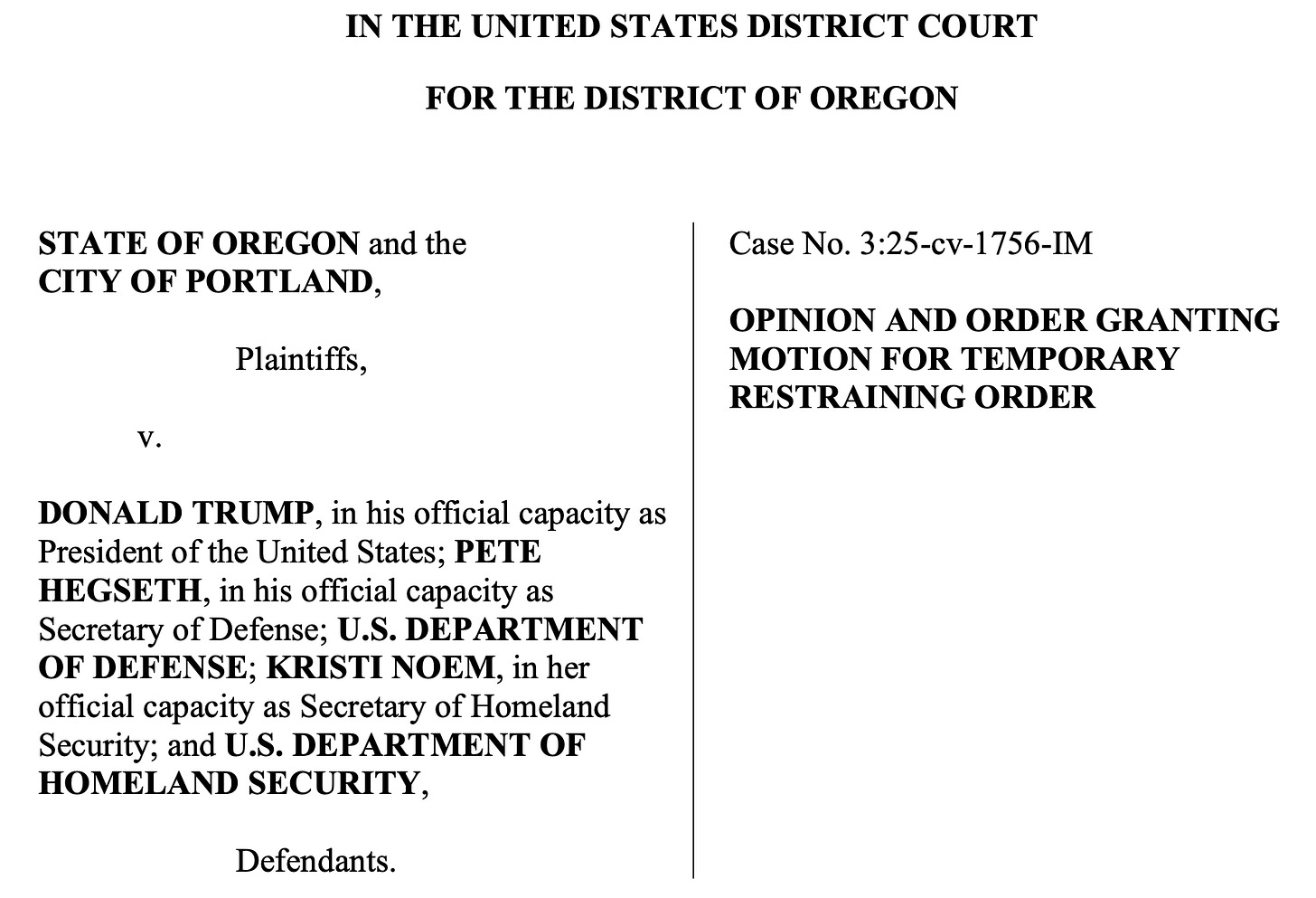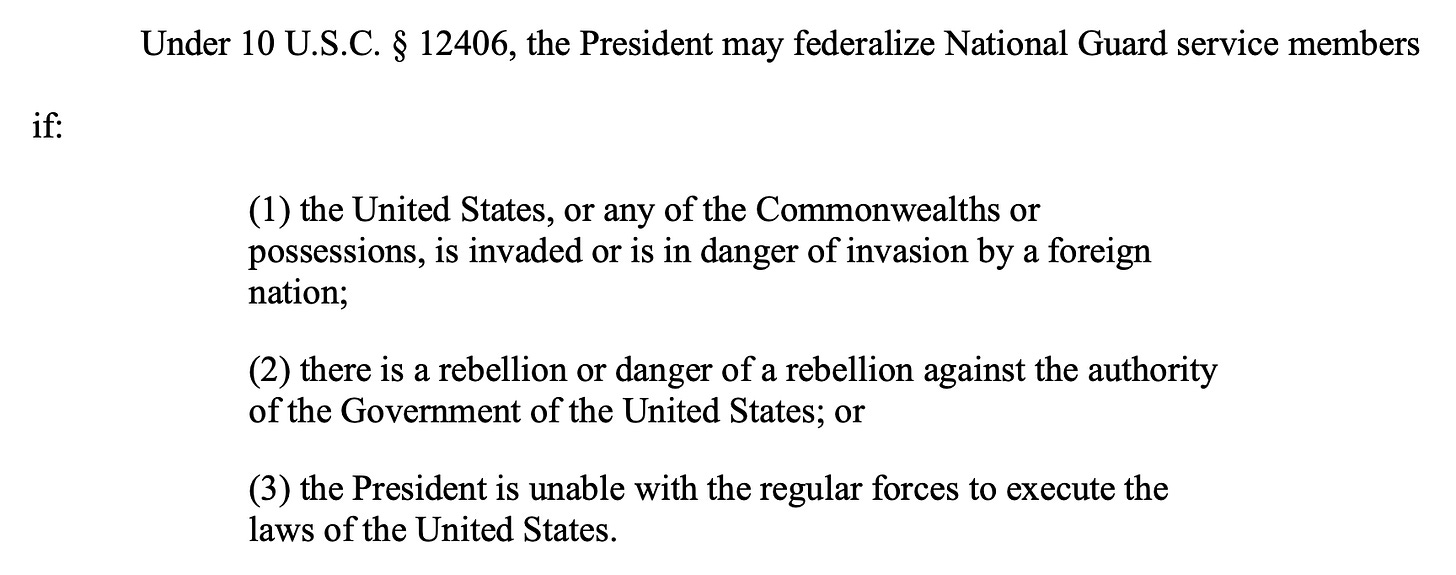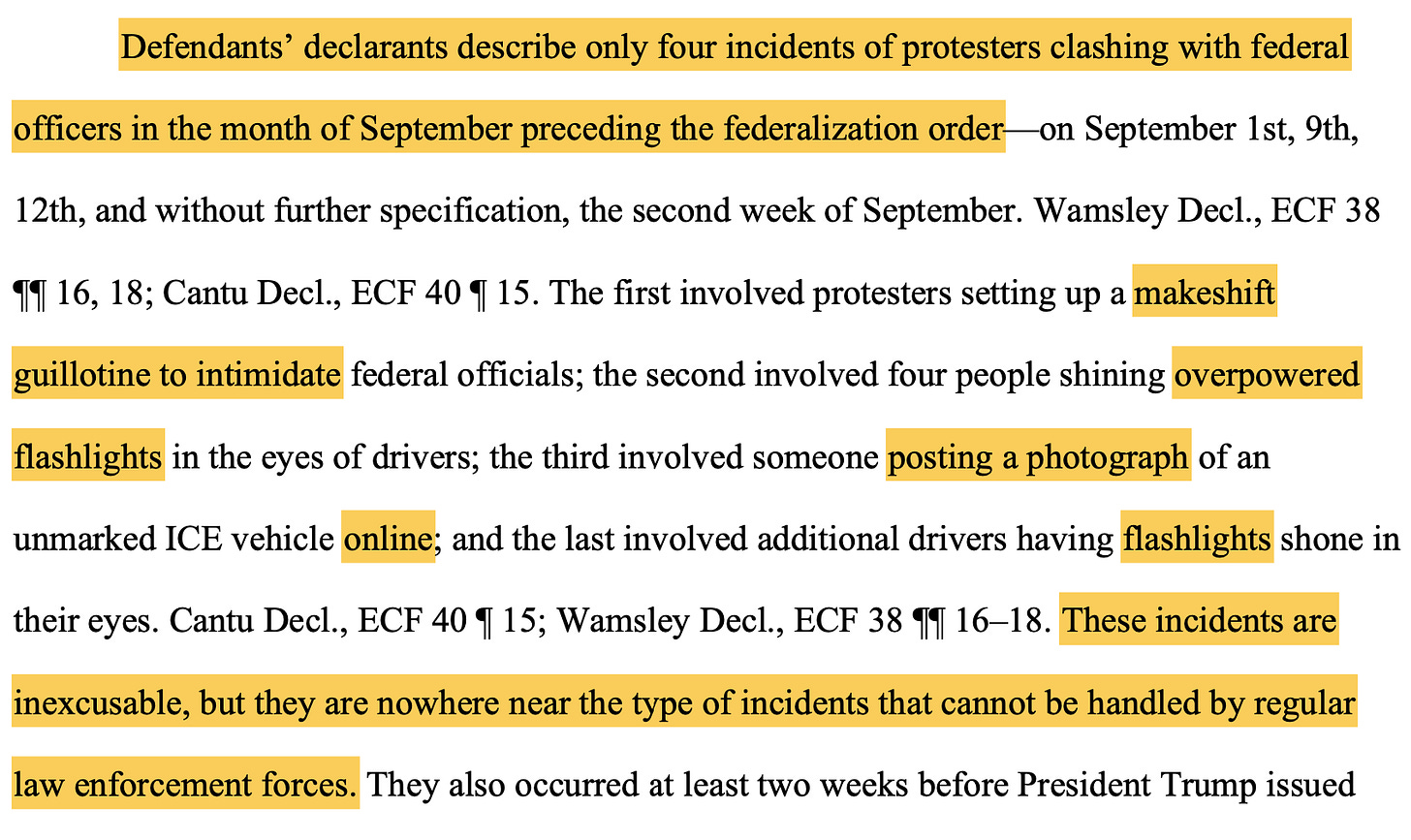Federal judge blocks Trump's National Guard mobilization in and to Oregon
"The President’s determination" that the Guard was needed "was simply untethered to the facts," Judge Karin Immergut, a Trump appointee, found. DOJ is appealing.
[Update, 11:45 p.m.: By Sunday night, a second temporary restraining order was issued in the case challenging the Trump’s administration’s National Guard deployment in Oregon. The new order bars the Trump administration from sending any National Guard federalized under 10 U.S.C. 12406 to Oregon from any state or D.C. The move followed actions by the Trump administration overnight to send members of the California National Guard to Oregon and plans to do so as to the Texas National Guard as well.
At a hastily called hearing on Sunday night, U.S. District Judge Karin Immergut harshly questioned the Justice Department lawyer before her, Eric Hamilton, asking him — while noting that he is an officer of the court — “Do you believe this is appropriate way to deal with my order?”
Issuing the second TRO in as many days in the case, Immergut called the Trump administration’s actions in apparent response to her first order “in direct contravention” of it.
Read much more on the Sunday night developments in this thread from me over at Bluesky.]
Highlighting that America’s “historical tradition” makes clear that “this is a nation of Constitutional law, not martial law,” U.S. District Judge Karin Immergut on Saturday issued an order temporarily blocking President Donald Trump’s effort to deploy the National Guard in Portland, Oregon.
It was a blunt 31-page opinion issued by a judge Trump appointed to the bench in his first term in office declaring that Trump’s effort to federalize Oregon National Guard troops likely “exceeded his statutory authority” and likely violated the Tenth Amendment.
Immergut issued the opinion and order just one day after hearing arguments in the case, which was brought by both Oregon and Portland, and just two days after the case was reassigned to her. Immergut, who took her seat on the bench in 2019, is presiding over the case because Justice Department lawyers successfully asked the judge initially assigned to the case to recuse himself.
The Trump administration officials and agencies being sued “have made a range of arguments that, if accepted, risk blurring the line between civil and military federal power—to the detriment of this nation,” Immergut wrote in concluding her opinion.
Under the temporary restraining order, which lasts through the end of the day on October 18, the Trump administration is “temporarily enjoined from implementing” Defense Secretary Pete Hegseth’s September 28 memorandum federalizing the Oregon National Guard and ordering their deployment to Portland.
Before the end of the day Saturday, the Justice Department had filed a notice that it was appealing the TRO.1
At the same time, Stephen Miller — Trump’s deputy chief of staff and one of the key voices behind Trump’s immigration policies — was lashing out, referring to Immergut’s order as “[l]egal insurrection” and, by doing so, providing yet more evidence to be used in this and other cases.
And, National Guard remain deployed in Los Angeles and Washington, D.C., have arrived in Memphis, and their presence is — yet again — apparently imminent in Chicago.
While the administration was responding as it does, Immergut had already laid out a timeline for the case for the rest of the month, ordering any motion for a preliminary injunction to be filed by October 17, with opposition due by October 23 and and reply due by October 27.
“A combined hearing on the preliminary injunction motion and a trial on the merits … is set for October 29, 2025,” the order stated, beginning at 9:00 a.m. PT.
The order also noted that a follow-up call will be set for October 17 “to address whether this Temporary Restraining Order should be extended for another 14 days,“ which would enable a further TRO to last through November 1 — two days after the scheduled hearing and trial.
Immergut, in other words, wants to get this case resolved — and out from her court — as quickly as possible.
As was clear from Friday’s arguments, the Trump administration’s case fell apart for Immergut largely on one fact: There is nowhere near a crisis in Portland.
Under the law at issue — as Immergut highlighted — Trump can federalize the National Guard if specific conditions are met. And, given Trump and Hegseth’s actions in Los Angeles, there is recent precedent from the U.S. Court of Appeals for the Ninth Circuit — where both California and Oregon appeals are heard — applicable here.
First, the law:
Second, the precedent:
Finally, the facts in Oregon:
In this case, and unlike in Newsom II, Plaintiffs provide substantial evidence that the protests at the Portland ICE facility were not significantly violent or disruptive in the days—or even weeks—leading up to the President’s directive on September 27, 2025.
Immergut dove into the record:
As for DOJ’s arguments about activity that happened elsewhere across the country and a stated concern that the situation in Portland could get worse “at any moment,” Immergut did not consider that adequate due to the statute’s specific language, as well as the Ninth Circuit’s interpretation of it.
“[V]iolence elsewhere cannot support troop deployments here, and concern about hypothetical future conduct does not demonstrate a present inability to execute the laws using nonmilitary federal law enforcement,“ she wrote.
Then, as always, there were Trump’s statements. As Immergut summed up earlier recitation of his statements:
Despite the “minimal activity” outside the Portland ICE facility in the days preceding September 27, 2025, … President Trump directed Secretary Hegseth “to provide all necessary Troops to protect War ravaged Portland, and any of our ICE Facilities under siege from attack by Antifa, and other domestic terrorists.”
Looking at how the facts compare to Trump’s statements, Immergut wrote that “the President is certainly entitled ‘a great level of deference,’ in his determination [under the law in question] that he ‘is unable with the regular forces to execute the laws of the United States. … But ‘a great level of deference’ is not equivalent to ignoring the facts on the ground. … The President’s determination was simply untethered to the facts.”
After also finding that DOJ had also not made a case that a “rebellion” was present — based largely on earlier Ninth Circuit interpretation of that provision — Immergut thus found that Trump had likely exceeded his statutory authority in federalizing the Oregon National Guard. Accordingly, the Trump administration defendants also likely acted ultra vires — without legal authority.
From there, Immergut quickly found on another of the Oregon and Portland plaintiffs’ claims, writing, “Because the President is federalizing the Oregon National Guard absent constitutional authority, his actions undermine the sovereign interest of Oregon as protected by the Tenth Amendment.”
After finding rather easily that Oregon and Portland also showed that they would face irreparable harm without a TRO, Immergut ended on the public interest factor.
“[T]his country has a longstanding and foundational tradition of resistance to government overreach, especially in the form of military intrusion into civil affairs,“ Immergut wrote, making clear to the president who appointed her that she intends to hold true to that tradition.
Although TROs — because they are meant to be temporary in nature — are not generally appealable, higher courts can hear appeals if the TRO is acts like a preliminary injunction and DOJ has regularly been claiming that orders against the Trump administration fit that exception and appellate courts have largely gone along with that even if the court ultimately does not side with DOJ in the matter on appeal.








Brava, Judge Immergut … expect an ALL CAPS tirade.
Thank you. Glad to see at least one Trump-appointed judge understands the oath they took.